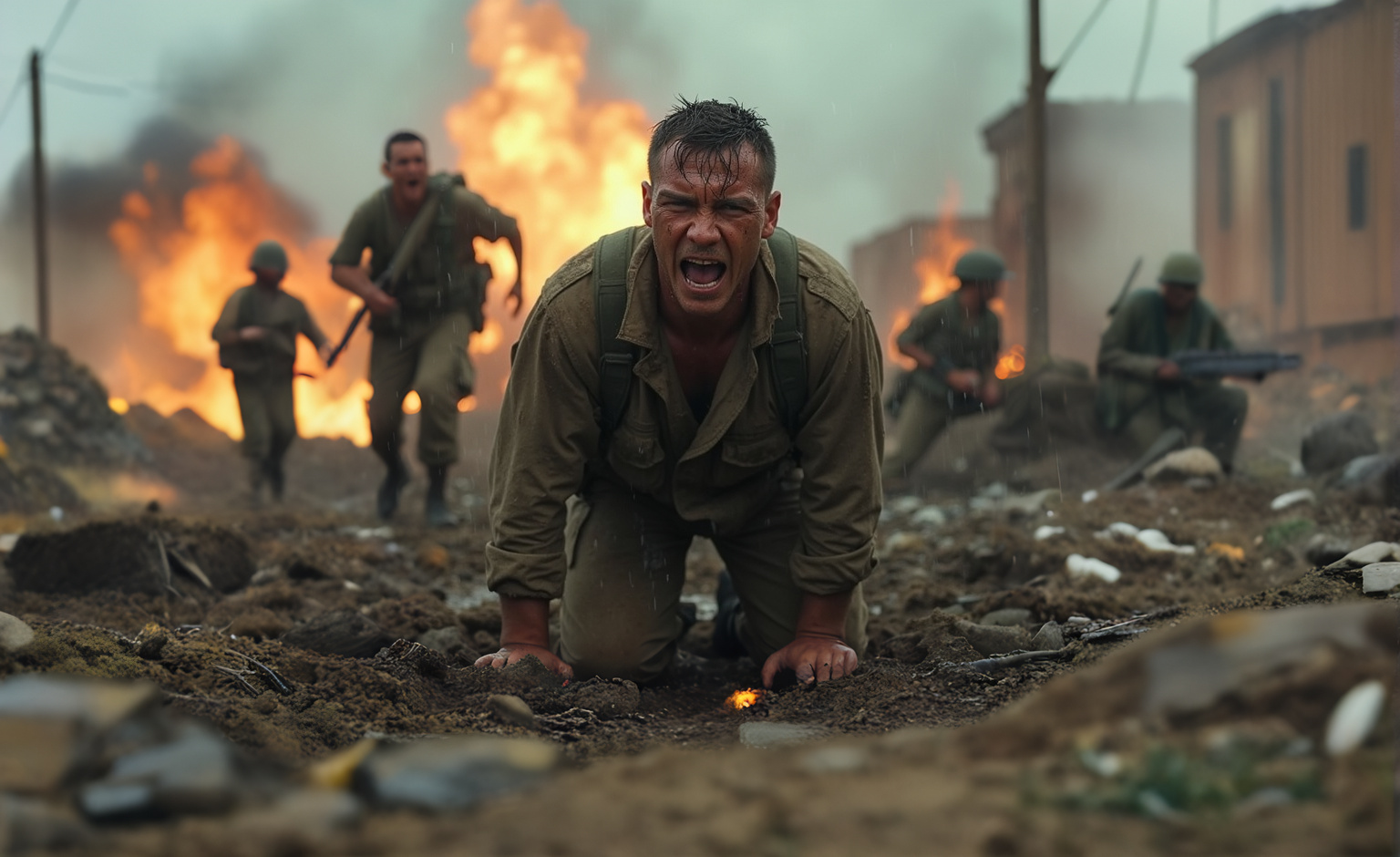The Philosophy of War: A Futile March Toward Nowhere

What are wars really fought for?
Ask anyone, and you’ll get answers dressed in flags: freedom, justice, national security. Scratch beneath the surface, and you’ll find the machinery humming not with the gears of justice, but with the quiet whirr of fear, ego, and illusion.
In today’s world, where poverty is not a technological inevitability but a political choice, we must ask: why do we still choose war?
Despite our capacity to solve global hunger, provide education for all, and connect across oceans in seconds, we continue to kill each other. Not out of necessity, but out of a tribal instinct masquerading as principle. Most modern wars aren’t about resources anymore. They’re about ideology—shallow, brittle concepts like who gets to govern whom, and under what philosophical brand.
Democracy versus dictatorship. Capitalism versus communism. Us versus them. The binaries are outdated, but the blood is real.
The Myth of Noble Conflict
We’re often told that wars are noble—battles waged to defend the innocent, to stand up for human rights, to defeat tyranny. But when you examine the reality of modern conflict, this narrative starts to unravel.
Take the Vietnam War. Or Iraq. Or Afghanistan. Massive operations, justified by vague threats or political ambitions, which left behind chaos, resentment, and fractured societies. In each case, the enemy was painted as subhuman, their defeat as morally righteous. But each time, it ended with more questions than answers.
As Alan Watts once pointed out, “Most modern wars are fought over political disagreements, which is pretty shallow.”
It’s not that evil doesn’t exist. It does. But war has never been a consistent solution to it. In many cases, it breeds the very extremism it claims to defeat. The fight for hearts and minds cannot be won with bombs.
The Knight on the White Horse
Even when we believe we are doing good—when we march into other countries as so-called liberators—we often misunderstand how we are seen. Alan Watts illustrated this perfectly with a now-famous metaphor:
“You are the knight on the white horse with the lance, and you’re going to rescue everybody. But then everybody says: ‘Knight on the white horse, aren’t you a stuffed shirt? You think you’re holier than everybody else. You offend us by your righteousness.’”
This is one of the most uncomfortable truths about war: even if the intentions are sincere, the impact is often the opposite. The so-called liberator is not welcomed but resented. People don’t see a savior—they see a foreign power interfering where it doesn’t belong. What’s meant to be help is perceived as provocation. The message sent is loud and clear: we don’t trust you to solve your own problems, so we’ll do it for you.
And that doesn’t bring peace. It brings hostility. It deepens divides. It creates resistance where there may have been none. Because no society appreciates being told how to govern, how to live, or who their enemies should be—especially by someone carrying a gun.
Even worse, the knight often rides in with a self-righteous attitude while his own house is on fire. The countries that claim moral authority abroad frequently ignore deep social, economic, and political problems at home. Poverty, inequality, racial injustice, political corruption—these don’t vanish just because they aren’t part of the foreign policy speech.
So when that knight arrives on foreign soil preaching virtue, locals see the hypocrisy. You want to fix us? Fix yourself first.
The knight may think he’s saving the village, but he’s just riding in circles, stirring up dust, and wondering why no one is grateful.
Fear Wearing a Uniform
Fear is the hidden architect of every war.
Fear of losing power. Fear of being attacked. Fear of losing status in a world where international influence is currency. These fears are projected outward—onto other governments, other ideologies, other people—and dressed up as moral obligations.
The language changes, but the motive remains: defend ourselves before they strike. Strike first if necessary. It’s a psychology of paranoia. And it creates a feedback loop where military buildup justifies further buildup, and every side believes it’s merely defending itself.
But if fear is the root, then what becomes of courage?
Watts once noted that if you’re fighting out of fear, you’re not a good soldier. Because real courage is about clarity—not panic in disguise.
Dehumanisation: The Essential Ingredient of War
To kill someone, you first have to stop seeing them as a person.
That’s one of war’s darkest tricks. It doesn’t just mobilise armies—it rewires minds. Propaganda turns people into symbols. Civilians become collateral. Children become statistics. And the enemy becomes a faceless, godless threat.
Dehumanisation is what makes war possible at scale. It’s what allows drone operators to press buttons that end lives thousands of miles away. It’s what lets politicians speak of “surgical strikes” as if they’re talking about precision engineering rather than torn limbs and shattered families.
It’s what turns soldiers into executioners without guilt—because they’re not killing people. They’re killing “terrorists.” “Insurgents.” “Communists.” “Savages.” Labels are cheaper than empathy.
This mental sleight of hand is essential. Without it, war would stall under the weight of conscience. But when the enemy is painted as less than human, even compassion starts to look like weakness.
It’s not a new phenomenon. Every war does it. From World War II to the current conflicts in Gaza and Ukraine, people are reduced to monsters so we can justify monstrous acts.
But here’s the truth: nobody wins in that process. Because when we teach ourselves to stop seeing others as human, we slowly lose our own humanity too.
The Hypocrisy of the ‘Good Guys’
Nations often justify their aggression by claiming to be on the right side of history. But to the people on the receiving end, that righteousness looks a lot like occupation. The supposed liberator often becomes indistinguishable from the oppressor.
When soldiers arrive, guns in hand, with slogans of peace, people don’t feel saved—they feel invaded. No country, no culture, wants to be corrected at gunpoint.
And the hypocrisy is clear. The same nations that drop bombs in the name of justice often ignore the suffering in their own backyards. Poverty, racism, corporate exploitation—none of it squares with the image of the heroic world police.
When we send troops into another country, proclaiming that we’re “rescuing” it, we must first ask: would we welcome the same intervention at home?
The Economic Incentive No One Talks About
War is not just about fear or ideology—it’s also big business.
Defense contractors thrive on conflict. Entire industries depend on it. Military budgets balloon while public services shrink. Politicians benefit from appearing strong. Media profits from the drama. There are careers and fortunes built on the assumption that war is inevitable.
So it continues.
Even when the justification is thin. Even when the mission is unclear. Even when the costs are measured in civilian lives.
War is rarely questioned seriously because too many people benefit from not questioning it.
The Real Cost of War
Beyond the dead and wounded, beyond the ruined cities and refugee camps, war leaves another lasting scar: psychological destruction. Soldiers return home changed, often broken. Civilians carry trauma that lasts generations. Children grow up shaped by violence, mistrust, and grief.
These aren’t side effects—they’re central.
And all too often, they’re ignored when leaders speak of victory.
There is no clean war. There is no moral war. Every missile has collateral damage. Every occupation breeds resentment. And every death—soldier or civilian—is a failure of diplomacy, empathy, and imagination.
What Would It Mean to Stop?
To seriously consider the end of war is to challenge the very idea of dominance.
It means investing in dialogue over defense. Education over escalation. It means rethinking strength—not as the ability to destroy, but the ability to understand.
It means asking harder questions: Can we handle difference without violence? Can we accept that our worldview is not the only one? Can we let go of the idea that killing solves anything?
Stopping war doesn’t mean weakness. It means maturity. It means rejecting primitive instincts in favor of intelligent cooperation. It means recognising that dropping bombs on people doesn’t change their minds—it hardens them.
Conclusion: The End of Illusion
Wars are not started by monsters. They’re started by people convinced they’re doing the right thing.
That’s what makes them so dangerous.
As long as we believe that we are the righteous, that war is justified if it’s for the right cause, the cycle will continue. Every side believes that. Every side is prepared to kill for it.
The real shift begins when we stop playing the role of the noble savior and start confronting the uncomfortable truth: war is failure. A failure of politics. A failure of imagination. A failure to see humanity in others.
It’s time we stopped glorifying it. Time we stopped calling it honorable. Time we started calling it what it really is: a futile march toward nowhere.








